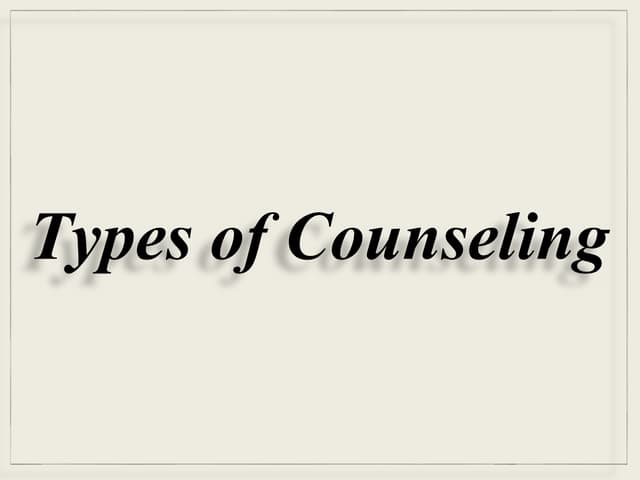adhd counselling sessions: Blending Therapy and Digital Tools
Wiki Article
A Comprehensive Overview to the Different Types of Therapy and Their Effect
Counseling encompasses a selection of therapeutic approaches, each made to fulfill one-of-a-kind psychological health and wellness requirements. From the structured techniques of Cognitive-Behavioral Treatment to the understanding nature of Person-Centered Therapy, these methods use distinctive paths to personal growth. Family members treatment and Dialectical Habits Therapy provide added frameworks for healing, while team counseling fosters area support. Understanding these varied techniques can illuminate their extensive influence on individual health. What stays to be explored are the details of each technique.
Recognizing Cognitive-Behavioral Therapy (CBT)
Although lots of healing strategies exist, Cognitive-Behavioral Therapy (CBT) stands out due to its organized, ambitious nature. This kind of treatment is based upon the facility that ideas, sensations, and actions are adjoined, and by altering negative thought patterns, people can modify their psychological actions and actions. CBT employs various strategies, such as cognitive restructuring, which aids clients identify and challenge altered beliefs. Behavioral activation encourages engagement in pleasurable tasks to deal with anxiety.Normally, CBT is a short-term treatment, usually long lasting in between 12 to 20 sessions, making it accessible for those looking for quick results. Its performance has been well-documented in treating anxiousness conditions, depression, and various other mental wellness concerns. The therapist's role is to assist clients via exercises and research jobs, fostering self-awareness and promoting long-term coping strategies. This functional technique equips individuals to take control of their psychological wellness, inevitably bring about improved life satisfaction.
Discovering Person-Centered Therapy
Person-Centered Therapy, established by Carl Rogers, offers a different approach to Cognitive-Behavioral Therapy by stressing the customer's subjective experience. This therapeutic model focuses on the individual's perspective, fostering an environment of compassion, unconditional positive respect, and authenticity. By allowing customers to explore their feelings and thoughts without judgment, specialists assist in personal development and self-discovery.The core tenet of Person-Centered Therapy is the belief that people possess the inherent capability for self-healing and individual development. In this setting, the specialist functions as a supportive overview as opposed to a regulation authority, encouraging clients to take fee of their very own trip. This method is especially reliable for those grappling with issues such as low self-confidence, anxiousness, or anxiety, as it encourages them to confront and understand their emotions. Eventually, Person-Centered Treatment grows a solid healing partnership, cultivating trust and openness necessary for purposeful adjustment.
The Function of Family Treatment in Healing
Family therapy works as an essential element in the healing process for individuals and their relationships. This therapeutic approach concentrates on enhancing communication, settling problems, and cultivating much deeper links virtual therapy among family members. By dealing with inefficient dynamics, family treatment urges each participant to reveal their ideas and feelings in a safe environment, advertising understanding and compassion.
The effect of household therapy prolongs beyond the sessions, as improved relationships can result in improved emotional well-being for all involved. Overall, family therapy plays an important function in healing by fostering unity, resilience, and common assistance amongst family members, ultimately leading them toward a healthier, more meeting life with each other.
Unboxing Dialectical Behavior Modification (DBT)
Structure on the structure of restorative approaches that enhance psychological wellness, Dialectical Behavior modification (DBT) provides a structured structure for people having problem with intense feelings and behavior challenges. Developed by Marsha Linehan, DBT integrates cognitive-behavioral techniques with mindfulness techniques, aiming to help customers handle overwhelming sensations and enhance interpersonal performance.The therapy is particularly advantageous for those diagnosed with Borderline Individuality Condition but is likewise suitable to a range of other psychological wellness issues. low cost therapy. DBT consists of individual treatment sessions and abilities training groups, focusing on 4 key skill sets: mindfulness, distress resistance, feeling law, and interpersonal effectiveness
The Benefits of Team Therapy Procedure
While individual treatment provides useful understandings, group therapy sessions offer special advantages that can significantly enhance the healing experience. One essential benefit is the sense of neighborhood that arises amongst participants. People often discover convenience in sharing their experiences with others facing similar difficulties, cultivating a supportive atmosphere that decreases sensations of seclusion.Group sessions motivate varied viewpoints, permitting individuals to learn from each other's coping methods and understandings. This cumulative knowledge can bring about boosted analytic abilities and a broader understanding of personal issues.
Additionally, group counseling frequently promotes responsibility, as members inspire one another to pursue their goals and follow their commitments. Finally, the cost-effectiveness of group treatment makes it an available option for numerous individuals seeking support. In general, the collaborative nature of group therapy sessions can greatly improve the healing trip.
Often Asked Questions
What Qualifications Do Specialists Required to Practice Counseling?
Therapists usually require a relevant level in psychology or counseling, along with monitored scientific experience. Additionally, they must get proper licensure or certification to exercise lawfully, guaranteeing adherence to professional requirements and ethical standards.Exactly how Do I Pick the Right Kind of Therapy for Me?
Picking the best type of treatment includes evaluating individual needs, discovering different strategies, thinking about therapist specializeds, and seeking referrals. Comprehending specific goals and choices can significantly boost the efficiency and satisfaction of the healing experience.
Are Online Counseling Sessions as Effective as In-Person Ones?
The efficiency of on the internet therapy sessions contrasted to in-person ones commonly relies on specific choices and scenarios. Research study suggests that both techniques can produce positive outcomes, though some may find better convenience in face-to-face communications.For How Long Does Counseling Typically Last?

What Should I Anticipate During My Initial Counseling Session?
During the first therapy session, clients can expect an introduction, discussion of their worries, establishment of objectives, and a review of the counseling procedure - relationship therapy. This preliminary conference intends to construct relationship and warranty convenienceReport this wiki page